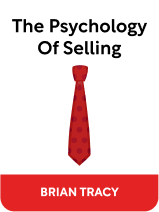

This article is an excerpt from the Shortform book guide to "The Psychology Of Selling" by Brian Tracy. Shortform has the world's best summaries and analyses of books you should be reading.
Like this article? Sign up for a free trial here .
What makes people buy? Are most consumer decisions rational (as most of us would like to believe) or emotional (driven by impulses)?
When a customer is faced with the option of buying a product or service, she can do one of three things: she can buy it, she can buy a competitor’s product, or she can buy nothing. In any case, this decision will be driven by her emotions: buying decisions are emotional, not rational.
In this article, we’ll take a look at the drives and emotions behind the consumer decision-making process.
Buying Decisions Are Emotional
People use rational thinking to justify a buying decision only after they have emotionally committed to it. For example, a person might fall in love with a shirt and decide to buy it. As she stands in the checkout line, she might rationalize that she needs this shirt because she has several events coming up she can wear it to. But those rational decisions are not why she settled on this particular shirt, or why she decided to buy it today: She decided to buy it because she responded to it emotionally.
In order to make a sale, you must therefore appeal to the emotions that will drive a prospect to buy (desire), and avoid the emotions that will block the sale (fear).
Basic Desires
The most basic desire behind sales decisions is the desire for gain and improvement. People make purchases with the intention of becoming better off in some aspect of their lives. If your product or service can promise to improve your customer’s life significantly, she’ll be less hesitant and more willing to pay a higher price for it. Basic human desires that a customer generally wants more of include:
- Money: People looking to save money or make money might buy investments or financial courses.
- Security: People who want to protect the things that are important to them, such as their personal belongings, their jobs, their health, their finances, and their data, might buy insurance or a back-up server.
- Personal growth: People looking to improve their skills—for example, to become a better tennis player—might purchase sessions with an instructor. Others might buy self-help books to get better at their jobs.
- Love and companionship: People looking for a romantic match might buy a subscription to a dating website.
- Health: Customers looking for the benefits of good health, including long lives and attractiveness, might purchase a gym membership or vegan cookbook.
Another basic desire behind many sales decisions is the desire for social approval. When a person considers a purchase, she often considers what others will think of it before making a decision. There are different ways this desire can manifest itself, including:
- The desire for status and prestige: Customers want products that increase their chances of being liked, respected, admired, and even envied. Products that do these things allow a customer to broadcast her success to other people.
- Being ahead of the pack: People love to feel up-to-date; being a trendsetter makes us feel like leaders. If your potential customer is a so-called early adopter—the 5 to 10 percent of the market who place a high premium on being “the first” to try something—then emphasizing that aspect of your product or service will encourage a sale.
Basic Fears
Conversely, the main reason a person decides not to make a purchase is fear. Fear can manifest in several ways, but the two primary fears that block sales are:
- Fear of losing money: People often fear spending too much on a poorly judged purchase. However, you can sometimes use a person’s fear of loss to your advantage: If a person fears losing out on an opportunity, they might be more motivated to buy your product or service.
Fear of making a mistake: People also fear buying something they later won’t want, don’t need, or that won’t help them in the way they’re anticipating. Everyone has made purchases they later regret. Consequently, most buyers approach purchases carefully.

———End of Preview———
Like what you just read? Read the rest of the world's best book summary and analysis of Brian Tracy's "The Psychology Of Selling" at Shortform .
Here's what you'll find in our full The Psychology Of Selling summary :
- How to dramatically increase your sales
- How to know what your customers are thinking
- Brian Tracy's 10 guidelines for success






